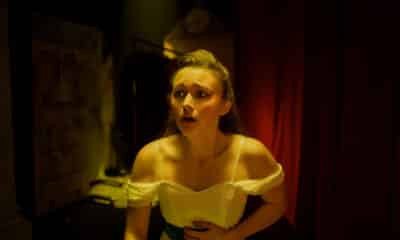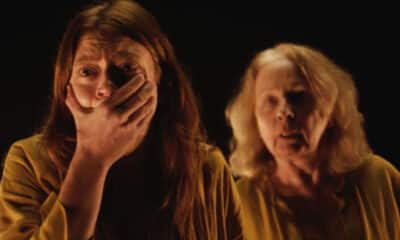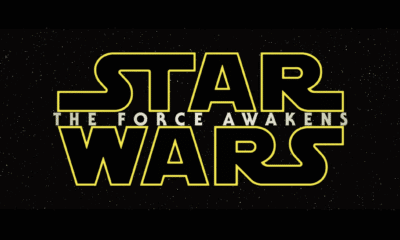
The incredible story of Alan Turing, one of the unsung heroes of World War Two, is brought to the big screen in THE IMITATION GAME which won rave reviews when it premiered at film festivals earlier this year.
Written by Graham Moore and directed by Morten Tyldum, Benedict Cumberbatch as Turing leads an all-star cast including Keira Knightley, Charles Dance, Mark Strong and Matthew Goode.
Turing, born in London in 1912, gained a first class honours degree in mathematics at King’s College, Cambridge. A brilliant mathematician, cryptanalyst and computer scientist, he joined the hand-picked team of scholars, linguistics experts and intelligence officers at Bletchley Park, the UK government’s code breaking centre in Buckinghamshire, working to crack German’s Enigma machine in 1939.
The Enigma machine was used for transmitting coded messages from the German High Command and the codes were changed every 24 hours. The Enigma was said to be “unbreakable” and cracking the codes – which would reveal the Nazi regime’s battle plans – was central to the Allies’ war effort.
Turing, an eccentric, sometimes arrogant and complicated man, railed against his superiors – personified in the film by Commander Denniston (Charles Dance) – who considered him a maverick who wasn’t delivering results.
Turing worked obsessively on his own electro mechanical code-breaking machine – a forerunner to the modern computer – that eventually provided the breakthrough and gave Britain and its Allies vital information on the enemy’s plans.
Ms Knightley plays Joan Clarke, herself a brilliant Cambridge educated mathematician, who became one of Turing’s key allies at Bletchley Park – despite battling against inherent sexism from her bosses – and became engaged to Turing.
Turing was gay and revealed his sexuality to Ms Clarke and even though their engagement eventually ended, they remained firm friends. After the war, when Turing was working in Manchester, he was convicted of ‘gross indecency’ at a time when homosexuality was illegal in Britain.
Turing opted for chemical castration rather than imprisonment and a year later, in 1954, committed suicide. He was just 41. A campaign to have Turing exonerated culminated in a royal pardon issued by The Queen in December 2013.
Former British Prime Minister Gordon Brown described Turing’s persecution by the state as “appalling.” Mr Brown, whilst still in office in 2009, said: “On behalf of the British government, and all those who live freely thanks to Alan’s work, I am very proud to say: ‘we’re sorry, you deserved so much better.’”

Screenwriter Graham Moore first heard of Turing’s remarkable life when he was just 14 years old. But he points out that Turing’s contribution to the war effort and his remarkable achievements are still mostly unknown in the wider world. He hopes that THE IMITATION GAME will change that.
“Alan Turing is this great unsung hero of the 20th century, who no-one knows about. This is someone who should be on the front page of the history books. He should be taught in every school class,” says Moore.
“He should be on money. It should be his face, when you buy a cup of coffee, that you hand over, but he’s not because everything that he did was classified, and because he was so horribly persecuted by the government for his homosexuality.
“It’s an amazing story, and we are humbled to have to privilege to tell it. It’s a tremendous responsibility to bring this story to light in an appropriate way.”
Tyldum – who enjoyed international recognition for his critically acclaimed thriller, HEADHUNTERS – didn’t know anything about Turing until he read Moore’s script.
“I was the opposite. I knew almost nothing. I made an action thriller, and then came to Hollywood. I was reading all these scripts for action thrillers and superhero movies, and then somebody said, ‘You have to read this beautiful little script.’
“I read it, and I was just blown away. I didn’t know anything about him, but I became obsessed with him.”
THE IMITATION GAME received rave reviews when it premiered at the Telluride Film Festival and, shortly afterwards, was presented at the Toronto Film Festival where it won the Grolsch People’s Choice Award.

Q: Have the festivals been kind to The Imitation Game so far?
Graham Moore: It’s been great, just getting to sit in the theatre and see the movie. I’d never sat in a theatre and seen the movie until last week, at Telluride, and it’s so nerve-inducing! My heart was beating, and I felt sick to my stomach, and then you turn around and just see hundreds of sobbing people. I’ve never been so happy to make someone cry.
Morten Tyldum: We’ve been in this little bubble, because it’s been such a passion project, and it was a small film. We’ve been doing this in our own little world, and then all of a sudden we have to send it out into the world. Telluride was amazing, because as a filmmaker, I’ve been to many festivals, but this is the first time I’ve been so close to the audience. We’re in this little village, and it’s just film lovers. We started with three screenings and ended up with six, because everybody wanted to see the film. We walked into a restaurant and the restaurant stood up and applauded. It’s stuff like that, which is really amazing. You don’t only meet press and industry people, you meet movie people.
Q: This story is still largely unknown, isn’t it?
GM: Yeah, and I think that’s why we all wanted to tell it. Alan Turing is this great unsung hero of the 20th century, who no-one knows about. This is someone who should be on the front page of the history books. He should be taught in every school class. He should be on money. It should be his face, when you buy a cup of coffee, that you hand over, but he’s not because everything that he did was classified, and because he was so horribly persecuted by the government for his homosexuality. It’s an amazing story, and we are humbled to have to privilege to tell it. It’s a tremendous responsibility to bring this story to light in an appropriate way.
Q: When did you first learn about Alan Turing?
GM: I was 14, 15. I was a huge computer nerd. I went to computer programming camp. My parents were like, ‘We had the nerdiest child we could possibly have – how did this happen?’ Among computer science people, Turin is like a legend. He’s this legend passed around among computer people for generations, from the Bill Gates and Steve Jobs of the world on down to 15 year old me. He’s the guy who secretly invented the computer, but no-one knew, and he was chemically castrated by the government.
MT: I was the opposite. I knew almost nothing. I made an action thriller, and then came to Hollywood. I was reading all these scripts for action thrillers and superhero movies, and then somebody said, ‘You have to read this beautiful little script.’
GM: It is little. You know what our budget is – it’s a little movie.
MT: I read it, and I was just blown away. I didn’t know anything about him, but I became obsessed with him.
Q: Did you wonder if it was true?
MT: Absolutely. I started researching, like, ‘I need to know everything.’ It’s the kind of thing that you dream of as a filmmaker – that you stumble upon this material. You say, ‘I have to make this movie or I’ll die.’ It becomes your little mission to do this and tell this story. It was beautifully written. We sat down and talked and it took us two minutes to find out that it was going to work.
Q: You decided immediately?
GM: Oh, we knew. I’d listened to pitches from, say, 20 or 30 directors – something like that. Two minutes with Morten and it was like, ‘Yep, done. This is the guy.’ I called everyone afterwards and was like, ‘Please, please, this has to be the person to do it.’ He just got it. He understood the story. He understood that this is a thriller, but it’s also funny at the beginning, and there’s lots of humour to be preserved. That was something that was really important to both of us, I think. This is a story that obviously is going to end in a suicide, and it’s going to get to a really difficult place, but we also get to explore every side of Alan Turing. There’s something really funny about his situation, his inability to communicate with people, and his taking of everything that’s said to him literally. It’s funny, and we could find jokes there. We didn’t want to make a sombre movie. We did not want to make a dry, dead, movie.
MT: We don’t even like biopics, so we said, ‘We don’t want to make a biopic!’ We wanted to make a layered movie. This could have been so many things: it’s a war story, a spy thriller, two love stories, a human rights element. We talked about how to seamlessly bring all these threads together. To me the movie is a mystery, and you unravel it and put it together. He was obsessed with puzzles, so we wanted the movie to become a puzzle.

Q: How did you approach the issue of his sexuality?
MT: We discussed this so much; because one of the biggest things is that he is a gay hero. Some gay people said, ‘I hope you show him having sex.’ I said, ‘No, he’s not.’ People say, ‘Oh, because you’re afraid people are going to be offended?’ No, that’s not the reason. It’s actually very prejudiced against gays to think like that.
GM: If it was a movie about a straight mathematician, you’d never say, ‘We need to see him f******.’ He’s gay, and he’s gay in the movie. Historically, he didn’t have any lovers when he was at Bletchley. It was a period that he described as a ‘sexual desert,’ in letters. What he was doing was illegal, and he had to keep it a secret.
MT: We wanted to say that every movie about a gay man doesn’t have to be first and foremost about that person being gay. First of all, he was a brilliant mathematician who cracked the Enigma, and he happened to be gay, which just happened to be illegal then. It’s a very important part of the story, but we wanted to treat it in the way it was written in the original script, which is more respectful than saying that because he’s gay, everything has to be about that.
GM: That attitude confines homosexuality to the act of sex itself, which I also think is really problematic. Alan was a gay man. Alan fell in love, for the first and only time, as a teenager, which we portray very graphically. I think that when you talk about gay love, the important part is the ‘love’ word, not sex. Showing the sex isn’t necessary. It’s about his love for someone else, not about the physical act of it. We just wanted to make a movie about a mathematician who happens to be gay, and not a gay mathematician.
MT: The great thing was that we had complete freedom. It was absolutely up to us. That’s why it was a small budget movie that just happened to get amazing talent. Everybody I asked, every actor, said yes. It was one of those rare occasions where everybody wants to be a part of it.
Q: We can only wonder what this man might have achieved, had he lived longer.
GM: Yeah, he died at 41, which is so shocking. And that’s one of the things that I think is so amazing about the movie. It makes you think about what wonders we might have lost in the world because of the way we treated homosexuals. The character of Joan, Keira Knightley’s character, certainly makes me think of how many other potentially once-in-a-generation geniuses were held back because they were a woman, and weren’t allowed to be a full professor at Cambridge. You see what homophobia and sexism institutionally did to generations of other possible geniuses who might have accomplished so much.

Q: Why has it taken so long for all of this to come to light?
MT: It’s the best kept secret in the history of intelligence. That level of secrecy for so many people, for decades is outstanding, especially today, where no secrets can even last minutes. Even when he was trialled, Alan Turing didn’t say anything. He just stood there, and he was very proud. Alan was not afraid. He stood up for it, he said, ‘I’m gay.’ He didn’t excuse himself, but he still said, ‘Not guilty.’ He didn’t go on and say, ‘By the way, guess what? I’m a war hero.’ They kept the secret of cracking Enigma for decades. They gave Enigmas to their allies to use and said, ‘This is an unbreakable code machine,’ and then they listened in on it, because they had broken it. It was very important for them to keep it a secret.
GM: It’s amazing for the people of Bletchley Park to be able to keep this secret for 30, 40, 50 years in a lot of cases. Think about all the secrets Alan Turing was keeping when he was going in front of a judge and being sentenced for ‘Gross indecency’, the crime of having had sex with a man. He could have raised his hand and said, ‘I’m a war hero. I broke this code. Call MI6, call MI5.’ But he didn’t. He kept the secret. It’s remarkable.
Q: Had you started writing the script before Gordon Brown made his apology for the treatment of Turing?
GM: That had already happened. Nora [Grossman] and Ido [Ostrowsky], our producers, had first heard about the story when Gordon Brown apologised, and they were like, ‘Who is this person? That’s a really interesting story.’ They researched it and optioned the biography, and then I got the opportunity to come on, through them. It was this dream opportunity, the once-in-a-lifetime chance to write this story.
Q: How important was it to film at Bletchley?
MT: Very important, and Sherborne, too. You walk up to the chapel and there is a memorial plate for Christopher Morcom, which actually was very emotional for everybody, because it reminded us that this is not fictional. These are real emotions and just to be there, in the hallways, which were so important for Alan, was very special. Alan wrote letters to Christopher’s mum all through his life.
GM: You realise the responsibility of what we had. You’re standing there, in Bletchley or Shelborne, and there’s a tremendous sensation of how these are real people who lived real lives, and it’s our responsibility to do them justice and to pay tribute to them with this film.

Q: You must have had to change some details?
GM: People are always like, ‘What have you made up?’ Yes, we did change little things, but every major point of the story is true. Every time anyone says, ‘Turin didn’t really write a letter to Winston Churchill, did he?’ Yes he did, that’s a true story. People say, ‘There wasn’t really a Soviet double agent at Bletchley Park, who MI6 had intentionally planted there, and who they knew was leaking the whole time?’ Yes, there was, it’s a true story. The most outlandish bits are the moments that are completely true.
Q: Did you have Benedict in mind from early on?
MT: He was the first and only one that I asked. I sat down with Keira and had a coffee and thought, ‘I’m not going to ask anybody else.’ The same with Matthew Goode, although I had Benedict ask him. Everybody said yes. I had this top level of British talent. I love British actors, because they’re extremely professional, and there’s such a dignity. They come in and take it so seriously, even the smallest part. Mark Strong comes along and he doesn’t have many big scenes but he comes in and delivers. We had a small budget and we couldn’t pay them a lot, but everybody just wanted to be a part of this. It was such a privilege as a filmmaker. It was like this all the way to the end. We were cutting without music, so, ‘Okay, who is my favourite composer?’ Alexandre Desplat, who makes phenomenal music, is overbooked, but he says, ‘I want to make music for this.’ He pushed things aside and composed the music. Everybody just came on board. I picked my favourite talent, like the production centre that I always wanted to work with. It was smaller budget, but everyone said, ‘I’ll do my best.’ It became this family, and it sounds too sweet, but that’s how it was. It was exhausting, and we shot everything in eight weeks. There was a lack of sleep, and everyone was going crazy, but it was a very unique experience because I think everybody wanted to do their best for Alan Turing.
GM: We got to make a movie with a cast and crew who were just as passionate about the material as we were, and that was the goal. No one was getting paid very much, but everyone was there because they wanted to be there, and they needed to be a part of telling this story.
Q: You must be very pleased with the performance of your young actors?
MT: Oh, they’re amazing. With Alex Lawther, if that didn’t work, we would be in trouble. They were so good.
THE IMITATION GAME opens in UK cinemas from Friday 14th November, 2014.


Latest Posts
-


Film Reviews
/ 2 days ago‘Fear Street: Prom Queen’ review: Dir. Matt Palmer (2025)
It has been four years since Leigh Janiak’s Fear Street trilogy took horror fans...
By Kat Hughes -


Film Reviews
/ 2 days ago‘The Surrender’ review: Dir. Julia Max (2025)
As Julia Max’s debut feature, The Surrender, unfolds, the inspirations for the film become...
By Kat Hughes -


Film Trailers
/ 4 days agoFirst trailer for Darren Aronofsky’s ‘Caught Stealing’
Sony Pictures has released the debut trailer for Darren Aronofsky’s new film Caught Stealing,...
By Paul Heath -


Film Reviews
/ 5 days ago‘Lilo and Stitch’ review: Dir. Dean Fleischer Camp (2025)
Director Dean Fleischer Camp won audiences over with the fantastic Marcel the Shell with...
By Kat Hughes







